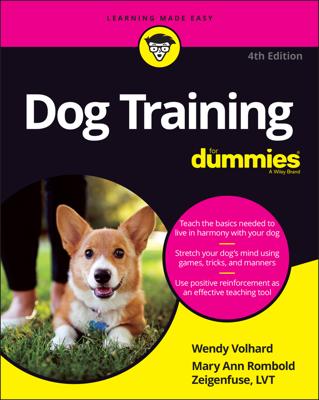When training your puppy, you should consider directions and problem-solving techniques that are personality-, size-, and age-appropriate, designed to build your puppy’s confidence both in you and in the world surrounding her. Think of puppyhood as your golden opportunity to influence and civilize your puppy.
Your puppy's first year
Here’s just some of what you have to look forward to as your puppy grows through her first year:
-
Infancy (8 to 12 weeks): Delightfully self-centered and curious, she’s experiencing her world — and all the people in it — for the first time.
-
Terrible twos (12 to 16 weeks): Before the terrible twos start, you may be convinced that you’ve adopted an angel. Then it will happen almost overnight: Your puppy will fall from grace. If it’s any consolation, all her mischief is a wonderful sign of normal development.
-
Budding adolescent (16 to 24 weeks): Okay, by now you’re getting a good glimpse of your puppy’s personality. Is she needy? Confrontational? Strong-willed? Dependent? Focused? Obstinate? Your puppy is maturing faster than you can keep up with. Now is the time to start fun, positive training routines and to increase games that encourage interaction.
-
Puberty (6 to 9 months): Random defiance, running off for hours, ignoring direction: Don’t take any of your pup’s frustrating behavior personally. Your puppy must challenge you in order to grow up. Through this age-appropriate behavior, she’s challenging your authority to ensure that she can trust your judgment.
The hardest behavior to control during your puppy’s first year won’t be your puppy’s — it will be yours! Anger and frustration will spell your ruin — your puppy won’t understand you, and she’ll react with confusion and possibly defensiveness.
-
Trying teen (9 to 12 months): At this point, you can see the light at the end of the dark tunnel. During this phase, if you’ve done your training, you’ll often have the perfect puppy — devoted, responsive, and mindful. Well, that’s to say, most of the time. Sometimes your almost-adult puppy still tests her independence; sometimes that incorrigible 3-month-old puppy reemerges, and she’s up to her old tricks.
Does committing the next year to training your puppy sound like a project? Well, you’re right — it is! After you commit to the role of your puppy’s teacher, she can learn all she needs to know throughout her first year — from where to potty and what to chew to polite greeting manners and how to conduct herself in a crowd. She won’t learn these things overnight, however — like human school, puppy training is a stage-by-stage process.
Teaching words your puppy should learn
Teaching your puppy commands is similar to teaching English as a second language. Though your puppy can’t understand sentences or phrases, one clearly spoken word, paired with a posture or routine, will make your puppy feel directed, connected, and safe.
Here are a few of the basic commands you should teach your puppy:
-
“Follow”: This command says, “I’m the leader. Follow me!” You use this one whenever you and your puppy are out and about.
-
“Stay”: This command is all about self-control! “Stay” tells your puppy to relax and be patient. After you’ve perfected some early lessons at home, you’ll be able to use it everywhere you go!
-
“Come”: A must-have in your command vocabulary, this one calls your puppy back to your side. You must teach this command positively if you want your puppy to listen!
-
“No”: Most dogs think their middle name is No! To teach this command successfully, you must focus your frustration on something besides your puppy and time it just right.
You can find many gadgets to help you convey and emphasize your directions, from clickers and target sticks to training collars and leashes. If you have family members involved in your pup’s training, have a group discussion to ensure that you’re all on the same page. Consistency is oh-so-reassuring to your puppy.

